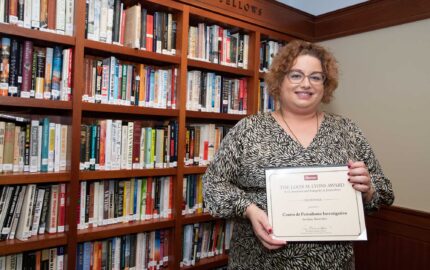“Take a hard look,” Jorge Ramos implored his audience, “because you’re looking at a dinosaur.” Ramos wasn’t talking about his 25 years on Univision’s news desk—or about his head of gray hair—but about the very nature of an evening newscast: Asking viewers to tune in at 6:30 each night for a half-hour recap of the day’s news, then to move on with their lives. “It really doesn’t make any sense,” he said. “Not anymore. Not when you have millions and millions of people getting their news on cell phones, and when the Internet is giving us the information that we need, and when Twitter is simply doing the job that I can’t do.”
Ramos, a veteran of Spanish-language television news who now hosts a nightly show on the English-language network Fusion, spoke at Harvard in early March at the invitation of the Committee on Ethnicity, Migration, Rights. The Nieman Foundation for Journalism, the David Rockefeller Center for Latin American Studies, the Instituto Cervantes at Harvard (Observatorio), and the Harvard Latina/o Student Alliance co-sponsored the event. He shared his own experiences as a Mexican immigrant in the United States and spoke about why he believes journalists with press freedom have an obligation to ask tough questions of politicians. He also discussed how the strength of the Latino voting bloc will have a major impact on the future political campaigns of both parties.
Ramos argues that Twitter is drastically changing how foreign news is gathered and consumed. He pointed to student-protesters in Venezuela who are using Twitter to circumvent censorship and connect with each other, and said that Twitter will also allow those students to be aware that students at Harvard are talking about them.
Ramos left his first television job in Mexico because his station wouldn’t air his reports critical of the country’s ruling political party. That early lesson in the power of press freedom left him determined to ask hard questions of those in authority after he came to the U.S.
Watch the Full Video
For more watch videos from a Nieman Foundation conference on immigration coverage and read “The Future Is Ours” from the Winter 2014 issue of Nieman Reports.


